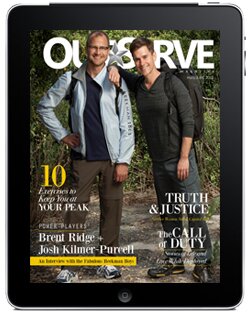Cover Story: Allyson Robinson

Soldier-Leader with Heart for Service + Vision Toward Progress

Allyson Robinson, her wife Danyelle and their four children at their home in Maryland. Photo taken by Jo Ann Santangelo for her multimedia essay, Proud to Serve: Portraits of Lesbian, Gay, Bisexual and Transgender Veterans.
By Jonathan Mills
As I sat in the conference room at OutServe-SLDN headquarters, waiting on the new executive director to sit down with me for one of her first interviews since being named as the leader of our newly combined organization, I began reviewing the material I had gathered for the interview. Though I had only one page of questions, there was a book’s worth of material in my mind that I had been going back and forth between —erasing and swapping some questions in my notes, and debating whether or not to add or delete more.
Here I was, about to interview the first executive director of OutServe-SLDN—and not just the first executive director, but one of the first visible transgender leaders in the entire movement. What does this mean for us? What does this mean for the movement? Is it too soon? Will our membership rally behind her? There was so much to ask, yet so little time to capture her biography in the space that had been devoted to this article.
Then my iPhone gave off its irritating little tri-tone alert. I looked down and saw an email from our trans columnist, Brynn Tannehill. I had told her earlier in the day that I would be meeting with Allyson and had reached out to her to see if there were any questions she thought would be of interest from her perspective. As I tapped the notification and the email popped up on my screen, I began to read her questions. And then it hit me.
Yes, people want to know what their leaders are going to do for them. Political races are full of agendas and 5-step plans. But when it comes down to it, people want a connection. They want to know that the person leading them is in their corner. They want to believe that if their leader’s vision, background and motivations align with their own, somehow, everything else will fall into place. And as that realization sunk in, I scrapped most of my notes just as Allyson walked in and took her place at the head of the table.
“The military is family for me,” Allyson said. “I grew up in a military family. My dad is a Vietnam veteran, his father was a veteran of World War II, so in many ways, the Army was our family business. So, this feels like coming home for me in a lot of ways.”
I had asked what motivated her to leave Human Rights Campaign and pursue the mission of equality with OutServe-SLDN. Struggling to figure out how to restructure the interview around my ‘aha!’ moment, I was trying to shift focus away from her agenda and more toward her, and this redirection was unnerving. How do you capture someone’s being in an article?
The moment she had entered the room, I felt compelled to jump out of my seat and stand at attention, just as I would if my commander had just walked in—not out of habit, really, more so because of her. Her quiet authority is an invisible presence, felt by everyone who has had the opportunity to speak with—or just be in the same room as her. It’s simply indescribable, other than to say she projects a calm assuredness and sincerity that makes one sit up and realize: this woman is a leader.
“One of the things that I learned from my dad is what it really means to lead. Leadership is about service. He made it very clear to me that he was in it for his Soldiers, and that if I was going to be a leader … then I needed to be in it for my people.”
‘So, who were her people?’ I wondered. I knew that she was from Scranton, Penn., and was a 1994 graduate of the U.S. Military Academy, where she majored in physics. She interned at the Los Alamos National Laboratory and commanded Patriot missile units in the United States, Germany and Saudi Arabia, and had even been a senior trainer and evaluator for NATO and advisor to the armed forces of Saudi Arabia, Kuwait and Qatar.
“Leadership is service. I remember my dad telling me how when his unit would go into the field and it would be time for chow, how he and his commander would linger back and wait for everyone else to go through the chow line first. And as a kid, that kind of struck me as odd. What about, ‘rank hath its privileges?’ Couldn’t you just step up to the front of the line and get the hottest food and have the most time to enjoy it? I’ve understood all my life why you can’t do that and why you don’t do that. And I think that value, which is so deeply a part of me, is a strength that I bring into this work.”
‘Allyson is a service member and a natural military leader,’ was my first thought.
But after resigning her commission in 1999 to pursue a calling in the ministry, Allyson went on to work in the Azores and central Texas, devoting herself to the issue of systemic poverty. She then returned to school, earning her master’s degree from Baylor University with an emphasis in social justice in 2007.
‘Allyson is a service member with a heart for serving not just her country, but her world.’
Prior to accepting her new position at OutServe-SLDN, Allyson headed the Human Rights Campaign Workplace Project, helping corporate human resource departments and emphasizing the value of inclusion and empowerment of LGBT professionals in the workforce. Her efforts also promoted awareness of transgender issues, driving corporate responsibility toward inclusion and equality of transgender people. “Some of the work I’ve done has prepared me for this role. Within the context of the movement and what it means to be a collaborative leader, a leader in partnerships with others, I’ve seen the importance of that in policy and legislative fights all over the United States. I believe in it because it works.”
It was my third realization that bought shape to this article. ‘Allyson is a service member with a heart for serving, and she has the vision to lead our organization, our country and our world toward progress.’
Several leaders within the organization had confided to me that if there had been any reservations about bringing Allyson onto the team, they were swiftly forgotten when she met with the Board and shared her heart and vision for securing equality for every service member and enhancing the readiness and effectiveness of the nation’s military. Her initial plan centered on two key issues: families and open trans service.
“The tasks that are ahead of us are very, very clear,” Allyson said. “We need to continue to press for equity of benefits for all of our service members,” referring to the current lack of health coverage, base access and family housing among other inequalities for families of LGBT service members. “Many of these benefits can be given with the stroke of a pen, right now, by our leaders at the Pentagon. We’ll continue to push to see that happen.”
This fight is as much recognition that military families are “force multipliers” as it is a personal one. Allyson credits her own success to her crew at home. She met her wife, Danyelle, at West Point in 1991, and together, they have four children, Truman, Jubilee, Deacon and Herald, all born on or around military bases in different parts of Europe. “They are my strongest support, my truest allies and my greatest inspiration.”
Though the discriminatory “Don’t Ask, Don’t Tell” (DADT) policy was repealed last year, the new legislation does not address the continued discrimination toward transgender military professionals. Unlike DADT, the ban on transgender service lies within service medical policies versus law set by Congress
When I asked what she would say to those who have expressed concerns about the lack of movement on the rights of trans service members to serve openly, her response left no room for doubt in my mind, nor did it leave anyone doubting at the annual International Leadership Conference in Orlando last month where most OutServe-SLDN members heard her speak for the first time. In fact, it reminded me of a moment when a newly elected President Obama in 2009 promised that “we will get it done,” referring to the repeal of DADT.
Just as President Obama’s quiet resolution transformed vision into action, so too will Allyson’s spirit of resolve. It made me want to run down the three flights of stairs into the streets of DC and shout, “we’re going to do this!” That resolve was so palpable, I feel as if the conference table and every other inanimate object in that room could have come alive and followed right behind.
“This is a fight that is important to us. And, together, we’re going to win this fight, just like we did ‘Don’t Ask, Don’t Tell,’” she said. “It’s going to take different methods, and it’s going to take time, but we are committed to winning. And we’re going to win.”








